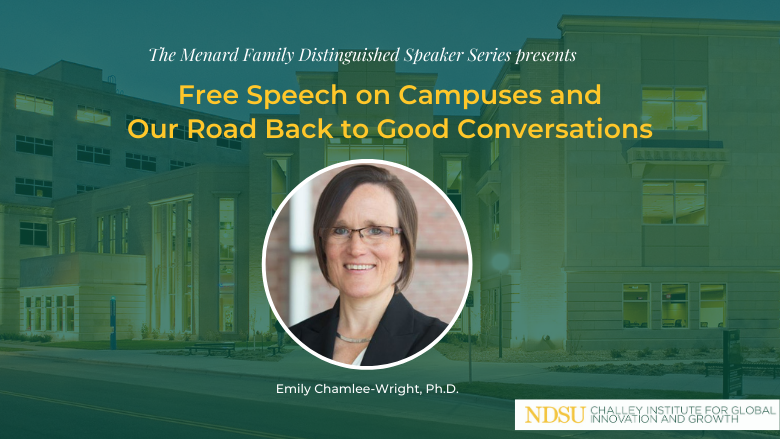
Emily Chamlee-Wright is the president and CEO of the Institute of Humane Studies
The moderated discussion included topics about free speech in higher education and how to be open-minded towards conversations
Emily Chamlee-Wright, the president and CEO of the Institute of Humane Studies (IHS), participated in the Menard Family Distinguished Speakers Series on Feb. 23.
The event was hosted by the Shelia and Robert Challey Institute for Global Innovation and Growth. NDSU Business Dean Scott Beaulier hosted the moderated discussion with Chamlee-Wright covering the topics of free speech in higher education.
Before talking about free speech on campuses today, Chamlee-Wright talked about the importance of free speech in higher education. “Why we care about this is because higher education really is a kind of foundational institution of a free society.”
“It’s in higher education that we can display those basic underlying principals of what it looks like to live in a liberal democratic society.” Chamlee-Wright explained that part of living in a democratic society includes solving disagreements by speaking to one another.
By having conversations with other people, Chamlee-Wright said that people govern themselves by holding themselves accountable for integrity, honesty, openness and a wiliness to listen to others. With this, Chamlee-Wright brought up the phrase “republic of science” which she described as “how a system of intellectual progress unfolds.”
While it’s important to be curious and open-minded to discussions, Chamlee-Wright talked about how to have conversations with people who have different perspectives. When encountering someone who is looking at the world from a different perspective, Chamlee-Wright said that it helps when each person wants to understand the other’s perspective better.
“If all I do is come away from the conversation understanding better why this really smart person sees the world differently than I do and understand that there’s a rhyme and reason behind that perspective, that’s a win.”
Chamlee-Wright said that the goal of conversations shouldn’t be about trying to persuade the other person. “Really trying to understand the wisdom that people bring with them into any conversation is a place to begin and it’s a posture of humility that we should all be entering into our conversations.”
Though openness in conversations is important, Chamlee-Wright said that there might be times when someone can’t agree with another person’s “immorally obnoxious points-of-view.” These might be times when someone chooses to step away from the conversation.
“I think before you step away you might offer them feedback and say ‘I think that point-of-view is wrongheaded, I think it is immoral and here’s the case I would make.'” By giving feedback in a confident and calm way, Chamlee-Wright said that it can give other people the language to do the same thing.
Chamlee-Wright also discussed how important professors are when it comes to learning how to talk through difficult conversations.
When it comes to the worst-case scenario of losing free speech on campus, Chamlee-Wright discussed the polarized society we’re currently living in and how the university setting demonstrates the principles of democracy.
“If we lose those animating academic values of the open university, society as a whole has lost one of its best examples of how to live together peaceably.”
Before joining the IHS in 2016, Chamlee-Wright was the provost and dean at Washington College and a professor of economics and associate dean at Beloit College. Chamlee-Wright has six books and is an expert on the topic of free speech policy and governance in higher education.
For more information about the Menard Family Distinguished Speaker Series, go to Distinguished Speakers | Challey Institute | NDSU.
